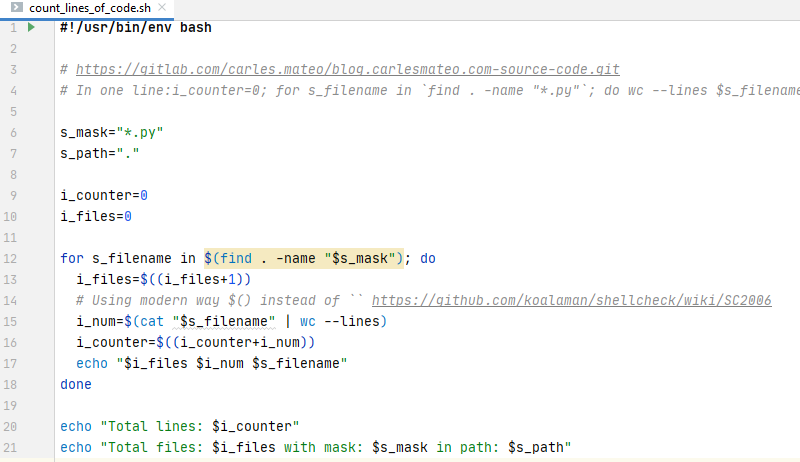A Bash script for counting the number of lines of your code
I’m teaching a friend how to code. Covid-19 has affected many people, with many jobs loss in many sectors. I encouraged him to learn to code and I helped him to access to a course offered by the Catalan government, but they let him down with a really difficult exam in the very last moment.
I encouraged him to continue and offered to help him, and after a start with several courses via Internet, that were not very useful, I started teaching and training him personally. And I did the way the companies need: Python, PyCharm, Git, Linux, VirtualBox, Web…
I told him since the beginning that I can help him, yes, but 90% has to come from his effort. I’m really happy to see that he is really doing the effort and how much he advanced.
Was not easy as I had to combine it with the classes in the university, my work, the Open Source projects, and my life… but I’m proud of him and of the effort he is doing.
Today he remembered me how shocked he was when I showed some Python builtin libraries, like datetime, and he saw in PyCharm, that the code of that library alone, has 2,476 lines.
I wanted to explain that we can get to create a program with thousands of lines of code, easily, so I decided to write a small program to count the number of lines of our programs.
I quickly wrote it in bash in one single line:
i_counter=0; for s_filename in `find . -name "*.py"`; do wc --lines $s_filename; i_num=`cat $s_filename | wc --lines`; i_counter=$((i_counter+i_num)); done; echo "Total lines: $i_counter"Execute it from inside your directory.
It can be improved and optimized very easily.
- wc is executed so it prints the lines and the filename, and then is executed as a pipe from cat to capture just the number, so the first one is not really needed. The same can be achieved with echo as we have the variables $s_filename and $i_counter
- You can filter out test files or others by using the find options or grep -v, for example to exclude test directories or files.
- Number of files can very easily added too.
- Using “” for avoiding problems with files with spaces.
- The better and most modern $() way to execute, instead of “ can be used.
I made some improvements abovementioned and uploaded this as a several lines script:

Please note this script does not only run in Linux, it can also be executed in Windows using GitBash.
For my Open Source project CTOP.py it’s 4,652 lines of Python code. :)
Rules for writing a Comment